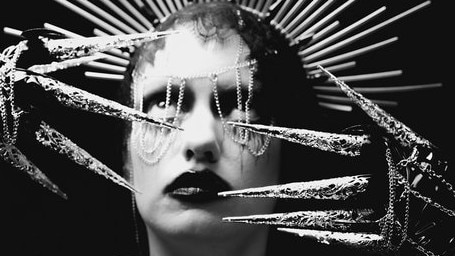From Truman Peyote to Sigmund Droid: how pop music fell for puns
A new wave of bands that aren’t just cover acts are using wordplay in their names, but then this goes way back to … the Beatles.

If you’re feeling down this January, I heartily recommend a trawl through the darker corners of Spotify or a visit to your local independent record shop. Left-field music is not renowned for its sense of hilarity, but a scan of the names of today’s popular bands is a hoot. Specifically the slew of awful puns – dozens of them.
Making a pitch for that neglected Beatles-Star Wars crossover are Texas shoegazers Ringo Deathstarr, and joining the dots between the galaxy far, far away and turn-of-the-century Vienna are Brooklyn band Sigmund Droid – “I am your father” meets “tell me about your mother”.
Then there is punk-metal-rap duo Bob Vylan. Meanwhile, the psych-rockers Truman Peyote have picked a name that evokes images of the author of In Cold Blood running through the Mojave Desert with his pants on his head. Sadly, it hasn’t helped their popularity – they have 10 monthly listeners on Spotify.
Elsewhere spoonerisms loom large, Wevie Stonder, Com Truise and Mill Burray being particularly egregious examples. Perhaps Mill Burray could be joined on a Ghostbusters-themed bill by Scottish emo rockers Dananananaykroyd?
Some of the best-worst names have been nabbed by more than one act, such as Harmonica Lewinsky, which has been adopted by a British blues group and a solo artist who describes himself as a “Cockney singalong entertainer”. Let’s pray their stage outfits do not include cigars or stained dresses.
My personal favourite, borrowed from Nick Hornby’s High Fidelity, is the choice of three different bands in Queensland, Toronto and South Warwickshire: the wonderfully silly Kathleen Turner Overdrive.
Punning names have been a thing in music for years, of course, from Poly Styrene and Buster Bloodvessel in the ’70s to Camper Van Beethoven in the ’80s, the Dandy Warhols in the ’90s and Kurt Vile in the Noughties. Actually, it goes back even further than that – the Beatles, let’s not forget, is a very feeble pun. Tribute bands have often cornered the market, from Bjorn Again and Proxy Music to Blobbie Williams and northeast England-based Reet Hot Chili Peppers (bravo).
Now, though, a surge of non-tribute bands has led us into a golden age of dreadful musical wordplay. You wonder if the rise of RuPaul’s Drag Race reality television show is something to do with it – Dot Rotten, Joanna Gruesome and Lana Del Rabies have an evil-twin vibe that’s reminiscent of drag queens such as Anna Bortion and Penny Tentiary.
“It’s funny you say that,” says Lana Del Rabies, whose real name is Sam An (thank God for that). “When I actually started establishing myself under this name, I was running into issues because there was a drag queen with this name.” Now she is the pre-eminent Lana Del Rabies, her stage name a wrong-footing counterpoint to her music, which is a shadow-strewn blend of goth, metal, industrial and electronica.
An’s new single is called A Plague and in her publicity shots she wears head spikes, black lipstick and Edward Scissorhands-style pointy finger covers. Her themes, she says, include “how we treat the powerless and how we abuse children without even meaning to” and “if there is a God, what would it mean for them to essentially see their creation destroying itself?”.
You can see why some light relief could be welcome. “However brooding and dark my work is, I also have a dumb sense of humour,” she says. “I have to have that levity in order to survive anything.” She is speaking by phone from her home in Phoenix, Arizona, and is charming and thoughtful, as supposedly scary musicians often are.
Her stage name came about because she started off making drone music that sampled female pop stars. She was drawn in particular to Lana Del Rey, the multimillion-selling “gangster Nancy Sinatra” from New York, whom she admired for “talking about co-dependent, intense, almost violent relationships. I appreciate her honesty in terms of being unapologetic about those times in her life”.
There are other things about Del Rey that she appreciates less, but she doesn’t want to go into detail because “she does go after people. Please don’t make Lana Del Rey hate me!”. There has never been the threat of legal action, although in January An’s Facebook page was deleted for 24 hours for “impersonating a public figure”.
She has considered jettisoning the alias. At one point “people weren’t necessarily engaging with the work, they just wanted to talk about the name”, she says, which makes me shift in my seat.
But “things have changed a bit”, An says. “Gen Z tend to be a bit more loose about those kinds of things.” God knows we need something to smile about, and in an era that zigzags between sincerity and satire it’s pretty much de rigueur to call yourself something that sounds like a social media handle. Or a drag queen.
“I’ve noticed that people are more receptive to it now,” An says. Her favourite musical pun is Salvia Palth, the recording name of Baltimore-based musician Michael Collins.
“That actually reminded me of my own situation because the name’s like ‘Ha ha, Salvia Palth’, but the music is very deep and dark,” she says. She likes the “unexpectedness” of calling herself something wacky, then blasting people away on a wave of demonic noise. Far from hating her, the other Lana should be applauding.
The Times
Lana Del Rabies’s album, Strega Beata, is released by Gilgongo on March 17.



To join the conversation, please log in. Don't have an account? Register
Join the conversation, you are commenting as Logout